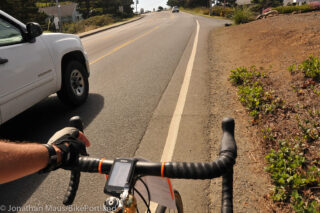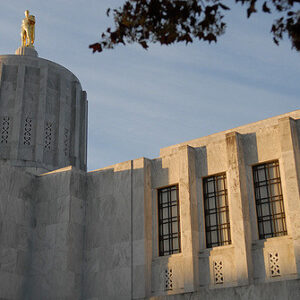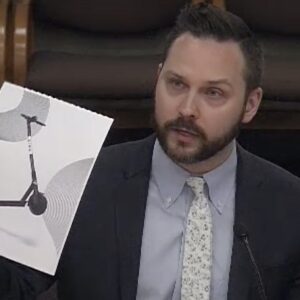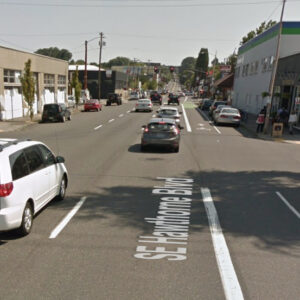
(Photo: Jonathan Maus/BikePortland)
There are plenty of important bills down in Salem this session, but as you might have noticed in the list of bills we’re tracking — and despite a supermajority for Democrats — bicycling doesn’t seem like much a priority. (Not that bicycling is a partisan issue, but in general Democrats tend to be more receptive to it than Republicans.)
When arguably the biggest bike bill in the mix is one that merely clarifies an existing law that bike lanes don’t disappear in intersections, you know it’s another down year for cycling in Salem.
I can think of several reasons why the issue has lost urgency with lawmakers; but instead of lamenting the state of cycling in our politics, I want to share a few legal ideas I wish we were working on.
— Bike tax repeal: The $15 tax on new bicycles that passed in the 2017 session is an embarrassment for our state. It was created as a tool to help make increases in automobile fees and taxes more politically palatable. It was also the product of lawmakers seeking to quiet constituents who constantly berate them with the tired “bicyclists don’t pay!” mantra. It makes no sense, it doesn’t raise a significant amount of revenue ($610,000 for the entire year, about half what was expected, while costing taxpayers $115,000 to administer), it discourages a behavior that should be promoted, and — newsflash! — it won’t shut up the haters. I heard there was some organizing from an independent lobbyist to work on a repeal, but I don’t think that effort got off the ground.
— Idaho Stop: Allowing bicycle users to treat stop signs as yields is a sensible way to improve cycling. As we reported in January, the circus of enforcement at stop signs has been a perennial problem in Portland. We very nearly passed Idaho Stop in 2009 and it deserves another chance.
— Move over for bike riders: Oregon should trash its existing bicycle passing law (which is ineffective, unknown, and therefore relatively pointless) and amend our much stronger Move Over Law to include bicycle riders, similar to a bill currently being discussed in Washington. The legislature recently expanded the Move Over Law to include drivers on the side of the road. Bicycle riders deserve the same respect.
— Studded tire tax: This should be a no-brainer. Studded tires cause millions in damage to our roads each year and they’re not necessary for the vast majority of people who choose to use them. Washington’s legislature has taken up a $100 fee and eventual ban. Oregon should do the same.
Advertisement
— E-bike incentives: Oregon has rebate programs for electric cars and motorcycles. Those programs should include electric bikes.
Rise to new heights.
Photo Credit: Adam P. #RamHeavyDuty pic.twitter.com/zrHmGSajr3
— Ram Trucks (@RamTrucks) March 14, 2019
— Big truck tax: There’s growing awareness that the alarming rise in fatal collisions involving walkers can be partly attributed to the increased popularity of large personal trucks (like the obscene one above). These huge trucks with massive front ends are largely a product of automakers’ greed and selfish consumerism — not a need for cargo and utility. If a person doesn’t have a commercial/business license, we should tax the purchase of large trucks and SUVs and put the revenue in a Vision Zero Safety project fund.
— Bicycle Safety Corridors: ODOT already has a “Safety Corridor” program. We should expand it and create “Bicycle Safety Corridors.” In more rural areas with popular bike routes, these stretches of road could come with increased fines for violations, more “Bikes on Roadway” signage, bicycle pullouts, more frequent sweeping/maintenance intervals, wider shoulders, and so on.
I love dreaming up new legislation. That’s the easy part! I know it takes a lot of work to turn them into laws.
Hopefully by the 2021 session cycling will be ready to emerge from the shadows and flex its muscles again as an issue worth fighting for at the State Capitol.
What do you think of my wish list? Any of these worth pursuing? What new cycling-related laws do you dream about?
— Jonathan Maus: (503) 706-8804, @jonathan_maus on Twitter and jonathan@bikeportland.org
Never miss a story. Sign-up for the daily BP Headlines email.
BikePortland needs your support.







Thanks for reading.
BikePortland has served this community with independent community journalism since 2005. We rely on subscriptions from readers like you to survive. Your financial support is vital in keeping this valuable resource alive and well.
Please subscribe today to strengthen and expand our work.
In addition to the move over law, clean up and make explicit the permissibility of crossing a double yellow line to pass a bicycle.
Crossing the double yellow to pass a bicycle is allowed, but not spelled out anywhere in the ORS. It’s a statutory construction exercise. People shouldn’t have to go looking for appeals courts rulings to understand the vehicle code.
Yes I agree. I’d like to make that part of the bill. If there is more than one lane, a driver would be required to move over into the lane. If there was only one lane, the driver would be required to slow down and pass at a minimum distance and only when it is safe to do so.
I actually remember the Legislature passing a law to enable crossing the yellow to pass explicitly. It was so long ago I don’t remember exactly when it happened, but I think it was in the late 90s to early 2000s period. How is this not reflected in statute?
I like the list. The bike tax repeal and studded tire tax could go together to be revenue neutral but there’s one lobby which has so successfully killed studded tire taxes in the past that no lawmaker will even consider something like this now. I’m talking about Les Schwab of course.
One thing that I’m always advocating for in order to improve commuting is bicycle and bicyclist facilities at people’s place of work. This doesn’t have to come with money attached as it can be a modification of building codes to require bathrooms with showers, lockers and enclosed bicycle parking.
The next hard part is getting a legislator excited enough about any of these ideas to make them a part of their agenda as every legislator goes to the capitol with their own agendas already full.
Portland’s zoning code already has requirements for bicycle facilities for buildings, although they don’t require as much as you describe.
Big Truck… Tax? Uh, how about Ban.
Trying to make them actually somewhat feasible BradWagon… although I do feel your pain.
Because if you actaully need to move lots of cargo a long way, a diesel truck is the right tool for the job, the emissions standards are getting tighter, cost of vehicle ownership is going up, and the pervasive nature of bro-dozers is likely to decrease with time, due to market and regulatory forces, so that a toaltal ban is not required.
Generally I’m not in favor of banning things, just heavily constraining;
Do you actually need a Ram 3500? Yes? Okay, well it’ll be expensive and you should need to pass a commercial drivers test and pay an extra fee if the bumper/bed height is above X distance from the ground.
What about “rolling smoke?”
I don’t think this is part of HB 2007 at this time but believe it was / is being considered.
https://olis.leg.state.or.us/liz/2019R1/Measures/Overview/HB2007
what John said.
Great idea Jim. That’s an issue that deserves some attention… And sort of related to the unhinged truck culture that’s making them larger and larger. Maybe the Bike Truck Tax revenue fund could also fund projects that reduce air pollution.
Funny you should mention that. I got coal-rolled less than an hour ago, on a quiet residential street in Hillsboro. Only the second or third time it’s ever happened to me.
And lookey here…. Judge just ruled against Diesel Bros in the coal-rolling lawsuit in Utah! https://www.standard.net/news/environment/judge-rules-diesel-brothers-liable-for-clean-air-act-pollution/article_33eb5348-5cd2-5bdb-9f59-575dae7e1539.html
My wish list: 1) strict liability 2) pedestrian/bike infrastructure mandates based on speed/traffic of the road 3) repeal child helmet law. 4) geofencing/speed governors for cars
I just think parents should be able to decide when or if their kids wear a helmet.
Or whether or not to vaccinate?
I like this list. I would add to it strengthening the Bike Bill and look forward to other ideas from BikePortland readers. To make any of these feasible, we need to cultivate more transportation leaders in elected office. In my career I’ve responded to anti-bike constituent calls and sat in many public hearings where anti-bike sentiments were on display. Yet I have still been surprised by the animosity toward bikes expressed by some of the legislators The Street Trust has met with to try to pass a common-sense clarification on bike lanes. BikePortland’s Idaho Stop piece from 2009 does not describe a bill that very nearly passed and it would get no further today (even without the BTA staffing issue featured in the article). We formed The Street Trust Action Fund to give active transportation advocates more tools to get the elected leaders we need to have the policies, laws and investments we want. Let’s grow that and we will be in a better position for 2020, 2021 and beyond.
“Yet I have still been surprised by the animosity toward bikes expressed by some of the legislators”
We are in the midst of a Culture War.
Bikes are a perfect token, red meat.
#45 is a troll who loves nothing more than to put a stick in the eye of those whom he casts as others. Many are more than happy to whistle that particular tune, stoke those flames.
another one I think about a lot pertains to how a group of bicycle riders treats stop signs.
When riding in a large group (more than 6 people let’s say), it’s ridiculous to think each person needs to stop completely at the stop sign.
It would make much more sense to have a law that explicitly allowed what we already do today. That is, to just have the people in front stop, and then all remaining riders in the group can roll through with them. This would be aimed at group rides and would have a limit of riders based on a time-frame or length of the group. So it wouldn’t allow “corking” for massive protest rides… But it would allow a cycling club of 12-15 let’s say, to all roll through in one bunch.
As I type this I realize how this idea would make current legislators’ heads explode and they’d reflexively freak out and vote against it. So — as Jillian so astutely points out in her comment above — we really need to get different people elected and/or spend much more time with existing ones so they can start to understand what life is like from the other side of their car windshield.
bingo John! I’m happy that that idea is understandable. As I’ve talked about it with other folks, I actually used the big-rig length idea. I would time how many seconds it takes for a triple-trailer to roll through, then estimate how many bicycle riders in a group could roll through in that same time period. That would give us an estimate for how many riders it applies to. And yes… it would save time, improve safety, and so on!
Should that idea ever be floated as a bill, be prepared for the devil’s advocates who would make the claim that drivers should be able to do the same thing.
“If 4 or 5 cars can get through an intersection in the same time as a big-rig, why should they have to stop individually if bicyclists don’t?! No Fair! ™”
Yes it’s inherently absurd, but such will be the argument.
oh i’d be ready. Thanks. We really need to have the conversation that bikes are fundamentally different than cars. And as such, should be regulated differently.
The “same roads, same rights, same rules” mantra is very outdated and we have to break from that to create the type of system we need.
“same roads, same rights, same rules”.
Indeed. This bugs me as much as “Share the Road”. Something along the lines of “same roads, same rights, different rules” would be more accurate for the current situation, although, “same rights” is tricky, since drivers have no “right” to the road, at least not while in their cars.
Yet any attempt to make the rules match the mode seems to be met with either claims of unfairness, or that bicyclists don’t “deserve” (or couldn’t handle due to extreme juvenile irresponsibility) things like an Idaho-style, stop-as-yield law. I want to know how it is that drivers “deserve” the royal treatment (much as many will scoff at that claim) they receive, while killing thousands of people per year. Oh, yeah—‘cuz they “pay their fair share” to build and maintain roads, and anyone who occasionally rides a bike anywhere “pays nothing”. How to overcome these hard-held, biased opinions and help people see that a) bicycling is a net positive, regardless of how personally inconvenienced you might feel for those ten seconds you have to yield to a bicyclist, and b) you could be that bicyclist—anything done to improve bicycling is done for everyone; it’s your choice whether you want to take advantage or not.
Sadly, I could also see an argument made that if bicyclists can’t keep up and/or follow the “same rules”, then they just need to get off the “same roads”, and leave those to the grown-ups.
Funeral processions.
If the trailer statutes haven’t been revised, they should be. I’ve made the comment in the past that sets out the statutes and having any human in a pull behind bike trailer is prohibited under those statutes. Its not something that gets cited, but should be removed just for the potential for it to be raised as a defense in any civil case if there is any sort of accident involving someone using a bike trailer for people transport.
The truck tax idea should include large SUV’s as well!
Yes… it would be nice to reverse the proliferation of those giant, flat-fronted, pedestrian killing trucks and SUVs.
absolutely! The bill language would define these vehicles in terms of size. Such as, height of bumper from ground, overall height of grill, size of tires, and so on.
Agree. Full size SUV’s are merely body on frame “light” trucks with passenger cabins and heated seats instead of cargo beds anyway, ex: GM GMT 900 Platform (Suburban, Hummer H2, Escalade EXT, Silverado Crew Cab, Yukon, Avalance) EXT.
As far as the passing law goes, it still astonishes me that not only is the Oregon statute vague in defining how much space a driver has to give a cyclist, it only applies above 35 mph. Many states (including Minnesota, where I live) explicitly state a 3-foot rule and it applies at all speeds
Although in a better world, the required distance would be greater at higher passing speeds. To this day, the most terrifying ride I’ve ever had was on US 97 between Shaniko and Criterion. I was well over halfway around a big loop ride and was pretty well committed to the route by the time I realized how sketchy it was. The official state bicycle map showed it as having a shoulder greater than 4′ wide, which was true but only barely. I’m sure the semis that were passing me a couple times a minute were not coming within 3 feet, but it sure felt like they were about to hit me.
“… it only applies above 35 mph.”
It also does not apply if a bike lane is present. If a bicyclist is riding outside a bike lane under any of the legal exceptions, or is riding in a bike lane, but near the line, there is no passing distance requirement, regardless of speed.
Yikes, wasn’t aware of that loophole.
Side guards on box trucks.
I have just one complaint about the list: It’s too perfect and leaves me nothing to complain about. 🙂 I do wish such a list was being considered (and passed) this year so we could move on to mikeybikey’s list next session.
Maybe the fact that our youth are rising up and demanding action on the climate crisis will eventually get our legislators to see the fire that has been lit and cause them to turn off the gas pipeline. When that happens, maybe this list will inspire them to make it so.
Dang! First nothing to nitpick about in the article, then a comment that’s the same way!
Actually, I used up my week’s supply of “recommendeds” on the other comments already.
It’s time to revisit the Bike Bill. I’m not up on all the details, but it’s pretty clear to me that the Bike Bill isn’t working … well enough. Why not? My suspicion is that it’s just the easy budget dumping ground to say, “Oh yeah, a shoulder plus a white line (which we would’ve done anyway) that’s now budgeted bike infrastructure*!” Checked the box, but nothing new ever.
*Caveat: I have no idea if this is actually how it’s working but it’s how it FEELS to me.
Thanks for the list. I’d include a regular bike rebate along with the electric bike rebate. It makes no sense that there’s a huge Tesla rebate (with huge manufacturing carbon impact) and no rebate for the ultimate low carbon transportation—a simple bike.